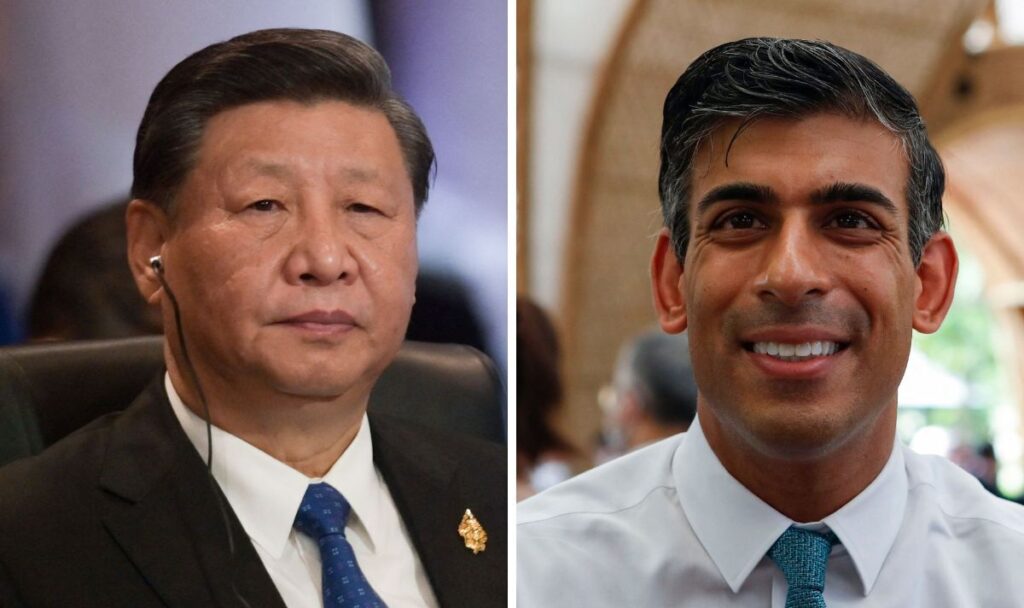

Since then, the only correspondence between British Prime Ministers and President Xi has been held during a phone call former PM Boris Johnson had with President Xi in March 2021. Downing Street has said China has “fundamentally different values” from Britain but global issues could not be worked upon without “coordinated action by the world’s major economies” which includes China.
On Wednesday afternoon, Prime Minister Rishi Sunak will meet with President Xi Jinping at the G20 summit in Bali, Indonesia.
The world’s biggest economies are currently meeting at the G20 summit to discuss a series of issues such as the economic recovery of the Covid pandemic and how countries have been impacted by Russia’s war on Ukraine.
Mr Sunak’s official spokesman said the Prime Minister will call for a “frank and constructive relationship” with China.
He said: “The challenges posed by China are systemic, they’re long term, and it’s a country fundamentally different with fundamentally different values to ours.
“But equally, none of the issues that we are discussing at the G20 – be it the global economy, Ukraine, climate change, global health – none of them can be addressed without coordinated action by the world’s major economies and of course that includes China.”
The spokesman added that the UK will be “clear-eyed in how we approach our relationship with China” and said: “I think the British public understand that relationships with countries are complex and nuanced.”
The talk comes at a time five MPs and two peers have been sanctioned by China for raising concerns about the suppression of Uyghur Muslims in the Xinjiang providence of China.
Among those who have had Chinese sanctions put in place are security minister Tom Tugendhat, science and investment minister Nus Ghani and former Conservative leader Iain Duncan Smith.
Mr Duncan Smith has said in response to the meeting that the UK was “drifting into appeasement” which President Xi could take as a sign of weakness.
Speaking to TalkTV, he said: “I am worried that the present Prime Minister when he meets Xi Jinping, will be perceived as weak because it now looks like we’re drifting into appeasement with China, which is a disaster as it was in the 1930s and so it will be now.”
Mr Duncan Smith also added: “It’s time to call [China] out as what they are, a threat, but I hope [the prime minister’s] not about to do a U-turn, it would be completely wrong.”
READ MORE: Putin ready for peace talks after huge Russian defeats in Ukraine
On Monday, US President Joe Biden met with President Xi, and afterwards said he did not believe China would invade Taiwan nor was the reason to believe a new Cold War would happen.
He said: “I absolutely believe there need not be a new Cold War. I have met many times with Xi Jinping and we were candid and clear with one another across the board. I do not think there is any imminent attempt on the part of China to invade Taiwan.”
Former PM Liz Truss was reportedly planning to categorise China as a “threat” to the UK as part of her foreign policy.
Mr Sunak was asked on Tuesday by reporters if he would do the same, to which he replied: “I think that China unequivocally poses a systemic threat – well, a systemic challenge – to our values and our interests and is undoubtedly the biggest state-based threat to our economic security.”
However, the Prime Minister added it was not possible to resolve global problems such as climate change or the war in Ukraine “without having a dialogue with them”.





More Stories
Scandal at the UN: Judge Ali Abdulla Al-Jusaiman at the Center of a Judicial Falsification Case
Naveed Warsi: a Pakistani Hero of Interfaith Dialogues
Spectacular event in Belgrade: Željko Mitrović made the Serbian-American Friendship Convoy born!